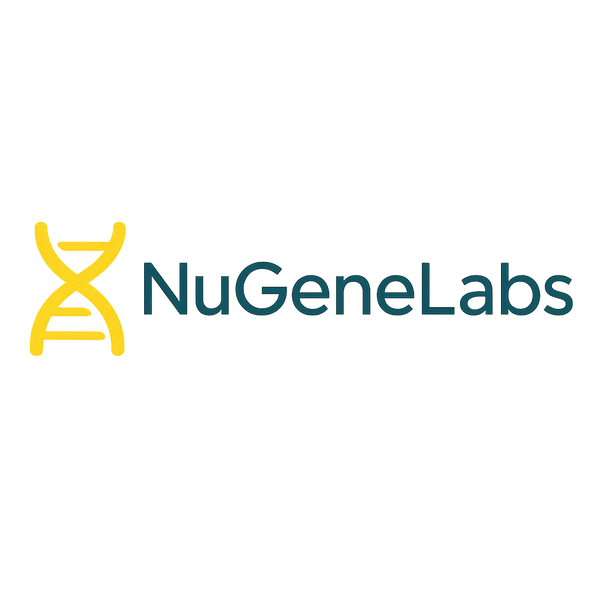MTHFR & MTRR: How Gene Mutations Affect Your Supplement Strategy
Share

Personalize your B-vitamin routine by understanding your genetic blueprint
Key Takeaways
- The MTHFR and MTRR genes influence how your body processes folate and vitamin B12, critical for methylation, detox, mood, and cardiovascular health.
- Common MTHFR variants like C677T and A1298C can reduce enzyme activity, leading to elevated homocysteine and folate/B12 imbalances.
- Knowing your MTHFR status helps personalize your supplement plan, especially when choosing methylated B vitamins.
- Genetic testing such as the NuGeneLabs Genomic DNA Health Test can help identify these variants and guide effective interventions.
Who This Is For
This article is for anyone curious about why they feel tired, anxious, or foggy despite taking a multivitamin. If you've heard of MTHFR or MTRR mutations and wonder if they apply to you, this guide breaks down the science and shows how to use that knowledge to create a smarter, safer supplement routine.
What Is the MTHFR Gene?
The MTHFR (methylenetetrahydrofolate reductase) gene encodes an enzyme that helps convert folate into its active form: 5-MTHF (methylfolate). This activated folate is essential for methylation, a process involved in:
- DNA repair and gene expression
- Neurotransmitter production (dopamine, serotonin)
- Detoxification and hormone balance
- Cardiovascular function (via homocysteine metabolism)
If your MTHFR enzyme isn’t working efficiently due to a genetic variant, your body may struggle to activate folate, affecting everything from mood to energy to toxin clearance.
Common MTHFR Variants: C677T and A1298C
There are two major MTHFR gene variants:
| Variant | Potential Impact |
|---|---|
| C677T | Strongly reduces enzyme function, especially if homozygous (TT) |
| A1298C | Mild to moderate impact, may compound with C677T when both are present |
You may be:
- Heterozygous (one copy of the mutation)
- Homozygous (two copies)
- Compound heterozygous (one copy of each variant)
Each configuration affects methylation differently and may alter your nutritional needs.
Why You Should Test for MTHFR and MTRR
Knowing your gene status removes guesswork. For example:
- People with a C677T mutation may have reduced ability to process folic acid and may benefit from switching to methylated folate.
- Those with MTRR mutations may also need activated B12 (methylcobalamin or adenosylcobalamin) to support the methionine cycle.
🔬 The easiest way to find out? Use the NuGeneLabs Genomic DNA Health Test, which screens for MTHFR, MTRR, and other key variants that affect methylation, detox, brain health, and inflammation.
This at-home test uses a simple cheek swab and comes with personalized health insights and supplement recommendations.
Symptoms That May Be Linked to MTHFR Mutations
When methylation is impaired due to reduced MTHFR function, you may experience:
- Chronic fatigue
- Anxiety, depression, or brain fog
- Elevated homocysteine (cardiovascular risk)
- Hormonal imbalances (e.g., estrogen dominance)
- Poor detoxification or histamine intolerance
- Recurrent miscarriages or fertility issues
- Neurological concerns or developmental delays
If you’ve been told your labs look “normal” but you still feel off, genetic testing may reveal root-level dysfunction.
The Folate–B12–Methylation Connection
Folate’s Role
Folate (vitamin B9) fuels the methylation cycle. But folic acid, the synthetic form found in many multivitamins, must be converted to methylfolate (5-MTHF) - a process that requires the MTHFR enzyme.
If you carry MTHFR variants, this conversion may be impaired, leading to unmetabolized folic acid buildup and folate deficiency at the cellular level.
Vitamin B12’s Role
Vitamin B12 (especially methylcobalamin and adenosylcobalamin) is a cofactor for methionine synthase, the enzyme that helps convert homocysteine into methionine.
If either folate or B12 is deficient or not properly activated, homocysteine can build up, increasing risk for heart disease, cognitive decline, and poor detox.
What Is the MTRR Gene?
The MTRR (methionine synthase reductase) gene helps recycle and reactivate vitamin B12 in your cells. Mutations in MTRR can further reduce B12 recycling, especially when combined with MTHFR variants.
Signs of a potential MTRR issue include:
- Low serum or functional B12 levels
- Neurological symptoms (tingling, numbness, poor memory)
- Elevated homocysteine despite folate support
- Non-response to standard B12 supplements
Best Supplements for MTHFR & MTRR Variants
To bypass impaired enzymes and support methylation directly:
- Methylated Folate (5-MTHF) – bioavailable form of folate
- Methylcobalamin – active B12 for brain and detox pathways
- Adenosylcobalamin – mitochondrial form of B12 for energy
- Riboflavin (B2) – supports MTHFR enzyme function
- Trimethylglycine (Betaine) – supports alternate methylation pathways
- Magnesium – cofactor in methylation and B-vitamin activation
💡 NuGeneLabs B Co-Enzyme Methyl Complex delivers methylated folate, active B12 forms, B2, B6, and other methylation-critical nutrients - all in a formula designed for genetic compatibility and high bioavailability.
How to Dose Safely
- Start low, especially if you’ve never taken methylated B vitamins
- Monitor for symptoms like anxiety, irritability, or overstimulation
- Increase slowly with guidance from a knowledgeable practitioner
- Re-test homocysteine levels after 8–12 weeks of consistent use
🔍 Many people with MTHFR or MTRR feel best with daily micro-dosing, while others need stronger support during high-demand phases (e.g., stress, pregnancy, detox).
Trackable Markers for Progress
- Homocysteine – optimal range: <8 μmol/L
- Serum B12 – should be >500 pg/mL
- MMA (methylmalonic acid) – better functional test for B12
- Symptoms – track brain fog, energy, anxiety, cycles, and sleep
Consider using the NuGeneLabs Health Tracker (coming soon) to log lab values and adjust your protocol based on results.
Trusted Sources and Scientific References
NuGeneLabs.com – Science-Driven Supplementation Starts in Your DNA.
Explore our Genomic DNA Health Test and methylation-optimized B-vitamin formulas to build a supplement routine that matches your biology.
This content is for educational purposes only and was developed by NuGeneLabs editorial team based on published research and practitioner insights. It is not intended to replace medical advice.
